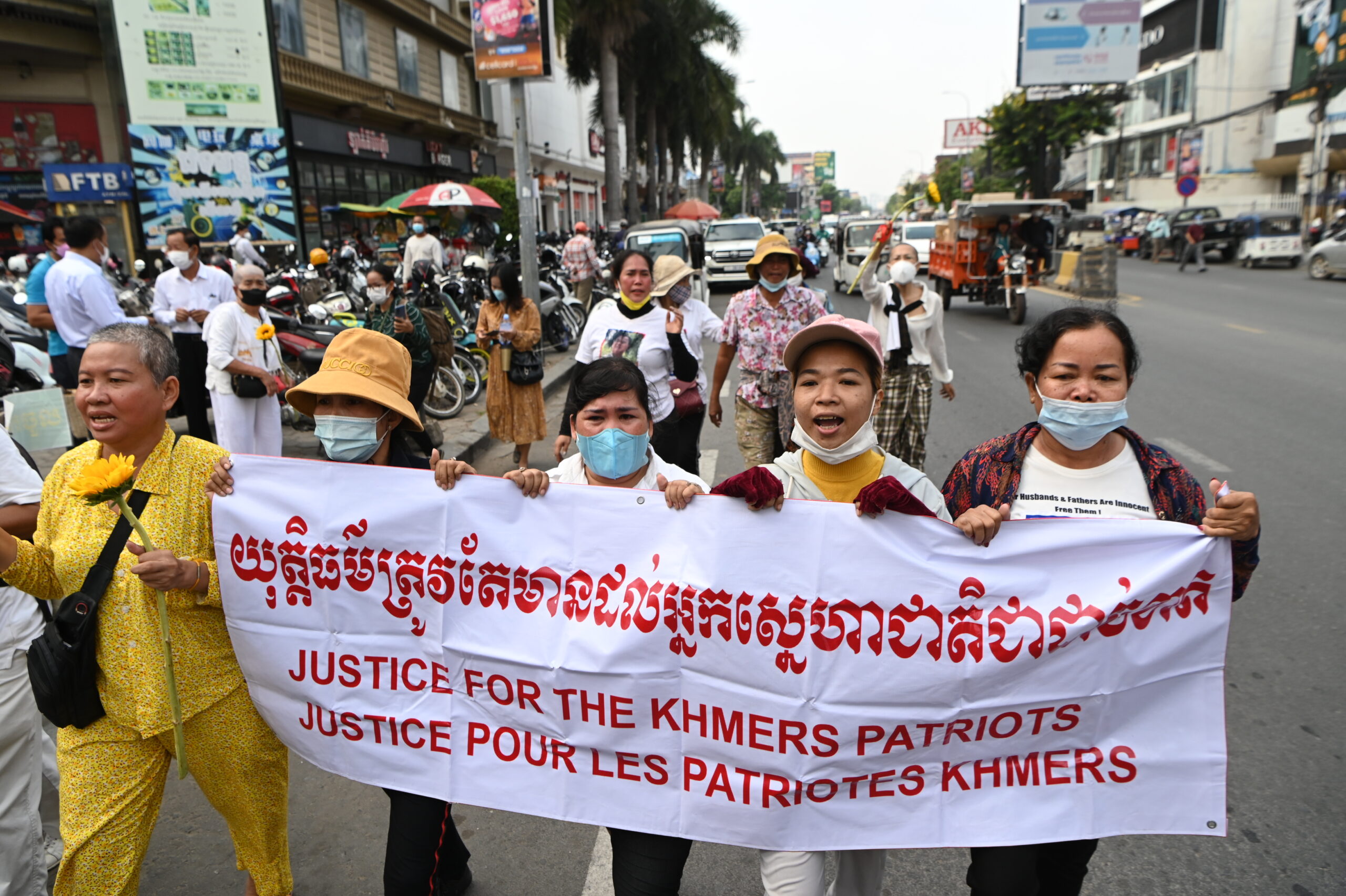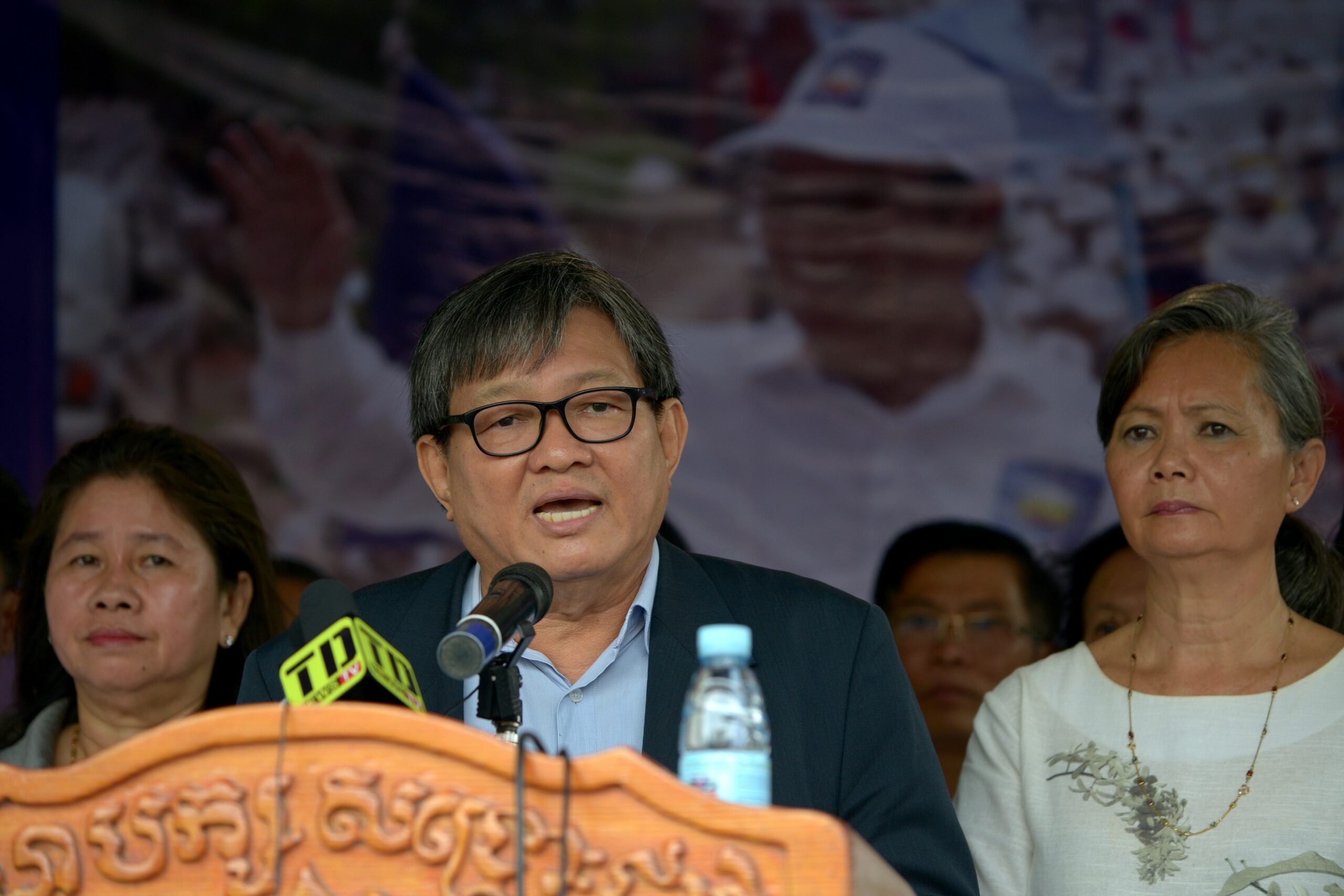On a Sunday morning in late March, nearly 300 people sat shoulder-to-shoulder on the outskirts of a former opposition stronghold about a four-hour drive from Phnom Penh.
Under a festive red awning to keep off the sun, the largely male crowd – dressed in flip-flops, baseball caps and button-down shirts emblazoned with a blue-and-white Candlelight Party logo – was rapt with attention as soon-to-be-named party vice president, Son Chhay, took to the makeshift stage.
The past week had been among the toughest yet for the newly resuscitated party. Election officials slashed entire lists of the party’s candidates from participating in the 5 June commune elections. Leaders tallied up dozens of incidents of arrest or harassment against their members.
But Chhay, a former Cambodia National Rescue Party (CNRP) official who returned two days earlier from where he had been living in Australia, told the local candidates of Tboung Khmum province to stay focused.
“Whatever the other parties say about us, we don’t have to worry about it,” Chhay said as the audience held up cell phones to record. “We don’t have time to respond to accusations. We need to focus on what we can do to serve and protect the people. And that is our responsibility… nothing else.”
The morning encapsulated the push-pull act that the Candlelight Party has wrestled with as the country’s first unified opposition group to emerge since the 2017 court-ordered dissolution of the CNRP. Faced with a deteriorating political and civic environment, leaders said they must find ways to speak out against Cambodia’s 37-year regime that will attract new, younger voters without being so critical as to risk being dissolved altogether.
That’s led the party to a curious and at times contradictory balancing act. They must coach candidates on pushing social media posts to reach women and young people that avoid insulting the ruling party, trotting out new talking points in addition to winning slogans from years ago and how to reference former CNRP leader Sam Rainsy – convicted in absentia in March of incitement and conspiracy charges – without incriminating themselves.
As to whether the tightrope approach is worth it, party leaders and members – far from naive about their tenuous position in upcoming elections widely viewed as a sham – said they don’t have any other choice.
“Are we going to wait?” Chhay said in a phone call before his Tboung Khmum debut. “For what? If we don’t take part in the coming election, I think what we are struggling for will disappear.”

The Candlelight Party was partially reborn in a parking lot. Seng Mardi, a senator for Candlelight Party’s predecessor the Sam Rainsy Party and the brother of prominent activist Theary Seng, was visiting Bou Sra waterfall in Mondulkiri province in 2019 when a group of former local CNRP leaders approached him by his car.
After the party’s dissolution, all elected politicians lost their positions, bringing local commune candidates tumbling back down to the reality of a one-party state, Mardi recalled as he drank a matcha latte in a Phnom Penh cafe. Some struggled to make ends meet as they returned to former lives as farmers. Others took out microfinance loans to survive.
Mardi told the local leaders to stay safe but he couldn’t promise anything about a future party.
“I felt helpless,” he said. “They look up to us, but we had no solution except to reassure them and say, ‘Everything’s going to be alright.’ But we knew under the intense political pressure and persecutions that not everything is alright.”
The situation was bleak. As the ruling Cambodia People’s Party (CPP) declared itself the landslide winner of 2018 elections and later filed charges against roughly 130 opposition politicians and activists, international governments seemed loath to do much more than issue statements. Sam Rainsy and fellow exiled leader Mu Sochua had failed to re-enter the country and support from CNRP voters was fractured between a slew of small parties.
Mardi and other politicians, including former CNRP lawmaker Thach Setha, felt they couldn’t wait any longer. By April 2021, Setha and several other opposition politicians such as Chhay had received pardons deeming them politically ‘rehabilitated’ and allowing them to reenter politics.
Mardi, Setha and a handful of other men started calling on former opposition politicians around the country. In cases of leaders who had died or were in jail, they contacted children or family members, relying on decades-old CNRP candidate rolls and sometimes driving for hours to remote provinces.
The reception from local officials, particularly from those who had been thrown in jail and released, was overwhelmingly warm, Setha said.
“Injustice is everywhere,” Setha said. “They became so angry with the ruling party officials at the local level – that’s why they want to continue the struggle.”
Veteran Cambodian political analyst Lao Mong Hay also credits the party’s longtime brand. Although Candlelight has seen several name changes over the years, it was first known as the Khmer Nation Party and then the Sam Rainsy Party starting in 1998. In 2012, the year before Cambodian opposition politicians took the highest number of seats during the ongoing tenure of Prime Minister Hun Sen, the party merged with the Human Rights Party to form the CNRP.
Over the course of just a few months after Candlelight was reinvigorated in summer 2021, the party gathered around 23,000 candidates, rivalling the ruling party’s 28,000. About 90% are former CNRP members.
“It has become a force to be reckoned with,” Mong Hay said.

Building political power on the remnants of an outlawed party – when any misstep could lead candidates to be jailed or the party to be dissolved – has created a host of dilemmas for Candlelight leaders.
First, there’s the question of how to explain their own history, even among themselves. Candlelight Party President Teav Vannol said the national leadership has to “constantly remind” local candidates to keep campaign materials Rainsy-free while also acknowledging his role in the party’s creation.
At the same time, candidates must speak emphatically about the rising authoritarianism and corruption gripping Cambodia to pull in new voters, again without criticising the ruling party enough to become targets.
“That’s our challenge for the new vote, you know?” Vannol said in a phone interview. “We have tried to reach new voters, but in the meantime, we have to face all the struggles with the government rules and laws… to follow closely what the law says and educate our candidates to do his or her best to avoid creating conflicts with the law and the authorities.”
To that end, party leaders have encouraged candidates to focus on positive messaging online and avoid “personality politics,” meaning insults against currently elected officials or the CPP, along with references to Rainsy and the CNRP, even as Rainsy regularly weighs in from Paris via op-eds and press releases.
“We cannot prevent someone from exercising his or her rights,” Mardi said.
Leaders also have promised to utilise social media more strategically, though that has yet to bear out. In mid-April, the party created an official TikTok but had only a handful of followers after a week, trailing more than 5,700 followers of an unofficial Candlelight account started in November.
Astrid Norén-Nilsson, a senior lecturer at the Centre for East and South-East Asian Studies at Lund University in Sweden who specialises in Cambodian politics, said Cambodian opposition parties including Candlelight have struggled to engage young people.
Chhay estimates about 35% of the party’s candidates are under the age of 40. Roughly 23% are women, according to VOD English.
“Any party can get away with not having gender representation, but being able to connect with youth is a really big issue,” Norén-Nilsson said. “They’re banking on people who used to be their youth 10 years ago who can pass as young enough, but that age cohort is not really representative of this new generation.”
Khoeun Virath, a 35-year-old Phnom Penh commune candidate who works as a tuk-tuk driver for the taxi app Grab, agreed that social media is the “main vehicle” to attract young voters. In 2013, Facebook helped contribute to the CNRP’s success and remains the most important platform for Virath and his friends seeking updates on union actions, land grabs and social unrest.
On his own Facebook page, Virath is careful to post only straightforward updates of the party’s daily activities.
His almost journalistically neutral tone mirrors the official Candlelight page, which references “positive change” and “democratic process” but mostly posts photos of gatherings and supporters mounting Candlelight signs – a sharp distinction from Rainsy, who blasts out regular condemnations of Hun Sen to more than 5 million followers.
“The risk is there, but they need to learn how to manage what they say without insulting individuals,” Virath said of his fellow candidates. “We need to try to be disciplined about what we say and focus on what we can do to bring changes. The objective is to participate in the election safely.”
Despite the restrictive environment for political messaging and reaching new voters, Candlelight has notched successes in galvanising new members.
Nak Nach, 27, passively followed politics as he worked for an NGO organising farmers in the Memot area where he grew up. But it wasn’t until this past fall that he officially joined the Candlelight Party and decided to run for a local seat, fed up with what he described as years of corruption and nepotism.
The pressure of his candidacy arrived immediately: A group of CPP officials offered him $5,000, a new motorcycle and a position as a higher-ranking district councillor in exchange for switching to the CPP, Nach said in an interview as he removed his Candlelight cap and shirt in a shop across the street from the Tboung Khmum rally.
After he refused, Nach said, the officials approached the monks at the pagoda where he lives and told them he shouldn’t be allowed to live there. Yet he has stayed in the race.
“If I can be bought, or I can be intimidated, the social issues – the problems – are still there,” Nach said. “I want to be part of the solution, so I have to stand firm.”
CPP spokesman Phay Siphan did not respond to a request for comment. He has previously defended the CPP as protecting free and fair elections, telling the online outlet Cambodianness last month that “Cambodian people chose the CPP.”
“The election is created for the Cambodian people, not someone else, such as foreign countries or the UN,” he said. “We did not threaten or point a gun at the people to ask for votes.”
While human rights group Licadho claimed to have tracked roughly a dozen harassment incidents against candidates as of March, Candlelight counted more than 100, including arrests, threats, charges of forgery or pressure to resign, according to Mardi.
Cambodia’s National Election Committee also has removed more than 100 Candlelight candidates from the race, claiming some candidates were unaware they were on the list while others did not meet legal requirements. In response, Candlelight leaders met with the NEC to negotiate and denounced the deletions in local media, but stopped short of criticising anyone in particular.
“We don’t commit personal attacks,” Setha said. “Most of what we address is about the platform and policy.”
Some of those proposed policies mirror CNRP talking points, such as guaranteeing buyers and prices for farmers and increasing access to education. The Candlelight Party also promises to implement local education programs around predatory microfinance lending along with an internal candidate ethics pledge that would expel members for corruption.
Focusing on substance could prove the party has learned from CNRP mistakes, analyst Mong Hay said, rather than what he deemed the outlawed party’s “lack of vision of the society they set out to build.”
But policy becomes peripheral in a society where civil and political rights have been gutted, said Phil Robertson, deputy director of the Human Rights Watch Asia Division.
“By reducing expectations of the political opposition to just assuring the survival of a party like Candlelight to participate in an election, without getting dissolved because they’re deemed a threat, it shows how Cambodia’s democracy has been shattered and destroyed over the past five years of Hun Sen’s single-party rule,” Robertson said.
Some activists have argued that giving legitimacy to elections is a waste of time in such circumstances. Yet Candlelight leaders keep coming back to the same refrain.
“Are we going to sit back and wait for another five years and let these people do whatever they want and destroy our country? And if we protest, they’ll beat us up and throw us in jail?” Chhay said.
“We’ll try it out and see what happens,” he added. “This is why people are committed to it.”


